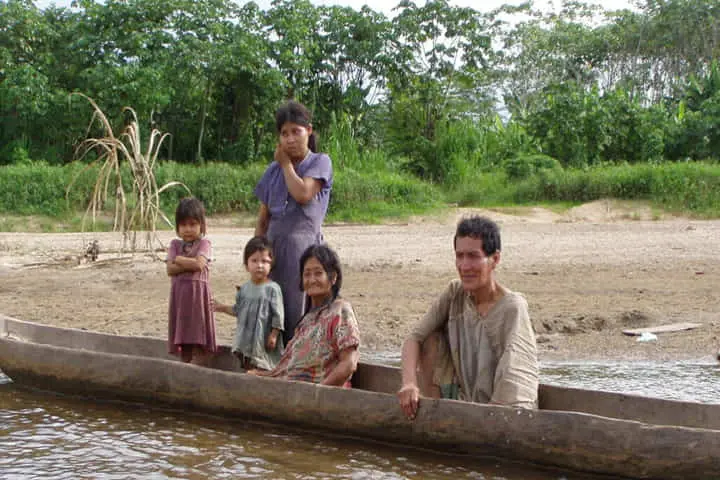

Members of the Tsimane community who belong to Bolivian Amazon (Pic. Courtesy Twitter/@farhadkaiser2)
<p>
<strong>Scientists, world over are concerned about some of the worst diseases afflicting humankind and among them is Alzheimer&rsquo;s and other varieties of dementia. Though we know how lethal their effect can be on those affected, there is hardly any clarity as to how it triggers in the brain and much less about its cure.</strong></p>
<p>
However, a report in sciencealert.com mentions that there are hints to be found among the native communities of Amazon rainforest which show that two of these have the lowest rates of dementia in the world.</p>
<p>
This finding has led to many suggesting that these low rates can be ascribed to life and the way we live in the post-industrial world which are causing increased incidence of brain disorders. While it is neither prescribed nor possible for the world at large to give up the present and take up hunting and gathering, yet this point can help the researchers dedicated to study dementia and its effects.</p>
<p>
The two communities who were studied belong to the Bolivian Amazon. These are the Tsimane and the Moseten people. The rate of dementia among the older people of the two communities was found to be about one per cent. This is remarkable when compared with figures of the United States which is 11 per cent among those above 65 years and above.</p>
<p>
<img alt="" src="https://www.indianarrative.com/upload/news/Moseten_Twitter_Nomdic_Tribe.webp" style="width: 720px; height: 480px;" /></p>
<p>
<em>A member of Moseten community (Pic. Courtesy Twitter/@Nomdic_Tribe_)</em></p>
<p>
Sharing her views about this, Margaret Gatz, a psychologist from the University of Southern California (USC) said: <a href="https://www.sciencealert.com/indigenous-amazonian-tribes-have-some-of-the-lowest-rates-of-dementia-in-the-world?utm_source=ScienceAlert+-+Daily+Email+Updates&amp;utm_campaign=e1c8f247d1-MAILCHIMP_EMAIL_CAMPAIGN&amp;utm_medium=email&amp;utm_term=0_fe5632fb09-e1c8f247d1-366100389">&ldquo;Something about the pre-industrial</a> subsistence lifestyle appears to protect older Tsimane and Moseten from dementia.&rdquo;</p>
<p>
The evaluation of dementia was done on the basis of a mix of tools. These included computed tomography or CT scans, cognitive evaluations, and questionnaires tailored for the culture they were being targeted at.</p>
<p>
Ironically, even though the rate of dementia was low, the prevalence of mild cognitive impairment or MCI, which is a less severe form of dementia, was as much as in countries like the US. Among the people above 60 years belonging to Tsimane it was 8 per cent while it was 10 per cent in the case of the Moseten community.</p>
<p>
Having discovered the difference in the incidence of dementia among the indigenous people and elderly of the US, scientists now want to find out the cause of this disparity.</p>
<p>
It is obvious that there is a vast variation in the lifestyle of the post-industrial world and that of indigenous Amazonian tribes. These are evident in diet, exercise, lifestyle, medication, sanitation and much more, yet it is tough to choose individual factors from this group.</p>
<p>
<strong>Also read: <a href="https://www.indianarrative.com/science-news/scientists-discover-how-the-brain-wakes-up-and-reboots-after-anaesthesia-156519.html">Scientists discover how the brain wakes up and reboots after anaesthesia</a></strong></p>
<p>
It is noteworthy that some people belonging to native communities have taken up a more contemporary lifestyle than others. For example, among the two groups being talked about the Moseten people are less isolated when compared to the Tsimane group because they are residing in close proximity to schools and towns and have better access to clean water.</p>
<p>
On this aspect, Arizona State University&rsquo;s anthropologist Benjamin Trumble observed: &quot;What we do know is the sedentary, urban, industrial life is quite novel when compared with how our ancestors lived for more than 99 percent of humanity&#39;s existence.&rdquo;</p>
<p>
With passage of time, scientists are gaining a better understanding of dementia like studies in the past have shown that lack of physical activity and increase in air pollution can be factors playing a role.</p>
<p>
Now the present study is offering another clue about hardening or calcifications of the brain arteries in people suffering from dementia or MCI and this link between the disease and blood flow is being investigated by the scientists.</p>
<p>
There is also a possible link between heart disease of the heart and aging of the brain. For example, the Tsimane people have particularly healthy hearts in old age as compared with the rest of the population.</p>
<p>
Hillard Kaplan, an anthropologist from California&rsquo;s Chapman University said: &quot;We&#39;re in a race for solutions to the growing prevalence of Alzheimer&#39;s disease and related dementias. Looking at these diverse populations augments and accelerates our understanding of these diseases and generates new insights.&quot;</p>
<p>
Details of the research were published in the journal Alzheimer&#39;s &amp; Dementia.</p>
Taiwan detected one sortie of Chinese aircraft, eight Chinese vessels and one official ship until…
Baloch activist Mahan Baloch delivered a powerful intervention that shed light on the ongoing human…
Prime Minister Narendra Modi spoke with the Myanmar military junta chief, Min Aung Hlaing, and…
The United Nations Human Rights Council (UNHRC) witnessed a strong intervention from Jamil Maqsood, the…
Union Home Minister Amit Shah on Saturday hailed the success of security forces in a…
India has launched 'Operation Brahma' to support earthquake-impacted Myanmar. Indian Air Force C-130 J aircraft…